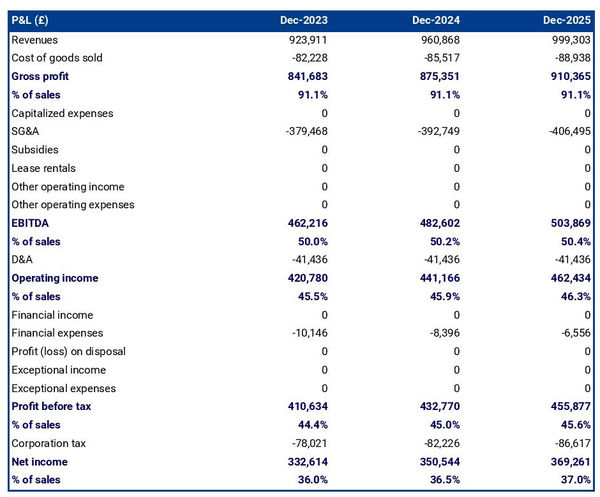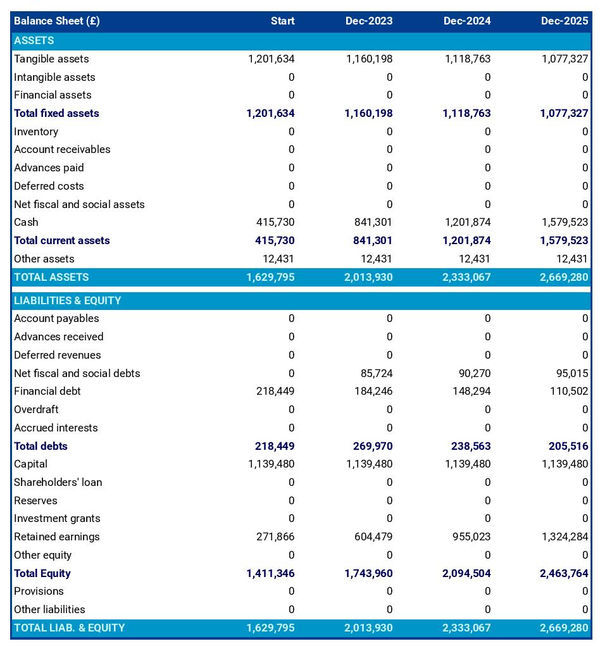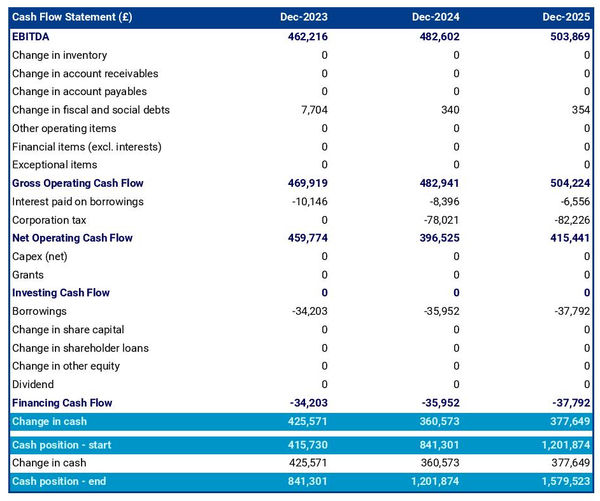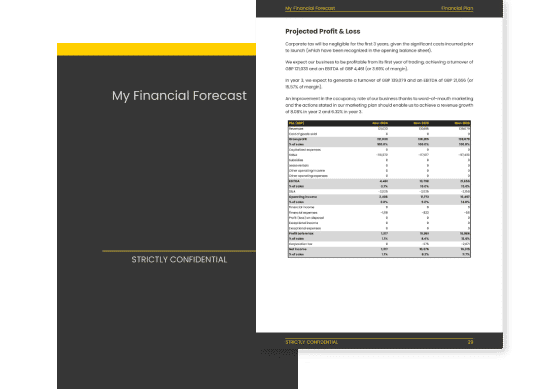How to create a financial forecast for a private investigation agency?

Creating a financial forecast for your private investigation agency, and ensuring it stays up to date, is the only way to maintain visibility on future cash flows.
This might sound complex, but with the right guidance and tools, creating an accurate financial forecast for your private investigation agency is not that hard.
In this guide, we'll cover everything from the main goal of a financial projection, the data you need as input, to the tables that compose it, and the tools that can help you build a forecast efficiently.
Without further ado, let us begin!
Why create and maintain a financial forecast for a private investigation agency?
The financial projections for your private investigation agency act as a financial blueprint to guide its growth with confidence and ensure its long-term financial viability.
To create them, you will need to look at your business in detail - from sales to operating costs and investments - to assess how much profit it can generate in the years to come and what will be the associated cash flows.
During challenging market conditions, maintaining an up-to-date financial forecast enables early detection of potential financial shortfalls, allowing for timely adjustments or securing financing before facing a cash crisis.
Your private investigation agency's financial forecast will also prove invaluable when seeking financing. Banks and investors will undoubtedly request a thorough examination of your financial figures, making precision and presentation essential.
Need a convincing business plan?
The Business Plan Shop makes it easy to create a financial forecast to assess the potential profitability of your projects, and write a business plan that’ll wow investors.

What information is used as input to build a private investigation agency financial forecast?
A private investigation agency's financial forecast needs to be built on the right foundation: your assumptions.
The data required to create your assumptions will depend on whether you are a new or existing private investigation agency.
If you are creating (or updating) the forecast of an existing private investigation agency, then your main inputs will be historical accounting data and operating metrics, and your team’s view on what to expect for the next three to five years.
If you are building financial projections for a new private investigation agency startup, you will need to rely on market research to form your go-to-market strategy and derive your sales forecast.
For a new venture, you will also need an itemised list of resources needed for the private investigation agency to operate, along with a list of equipment required to launch the venture (more on that below).
Now that you understand what is needed, let’s have a look at what elements will make up your private investigation agency's financial forecast.
The sales forecast for a private investigation agency
From experience, it usually makes sense to start your private investigation agency's financial projection with the revenues forecast.
The inputs used to forecast your sales will include the historical trading data of your private investigation agency (which can be used as a starting point for existing businesses) and the data collected in your market research (which both new ventures and existing businesses need to project their sales forward).
Your private investigation agency's sales forecast can be broken down into two key estimates:
- The average price
- The number of monthly transactions
To assess these variables accurately, you will need to consider the following factors:
- New regulations or legislation requiring stricter background checks or investigations (Driver 1)
- An increase in demand for corporate fraud investigations due to a rise in white-collar crimes (Driver 2)
- A decrease in the availability of skilled investigators in the job market, resulting in higher fees for their services (Driver 3)
- The development of new technologies, such as drones or artificial intelligence, that could potentially reduce the cost of investigations (Driver 4)
- An economic downturn leading to budget cuts for businesses and individuals, resulting in a decrease in demand for investigative services (Driver 5)
Once you have a sales forecast in place, the next step will be to work on your overhead budget. Let’s have a look at that now.
Need a convincing business plan?
The Business Plan Shop makes it easy to create a financial forecast to assess the potential profitability of your projects, and write a business plan that’ll wow investors.

The operating expenses for a private investigation agency
The next step is to estimate the costs you’ll have to incur to operate your private investigation agency.
These will vary based on where your business is located, and its overall size (level of sales, personnel, etc.).
But your private investigation agency's operating expenses should normally include the following items:
- Staff Costs: This includes salaries, benefits, and training for your team of private investigators.
- Accountancy Fees: As a business owner, you will need to hire an accountant to help you manage your finances and taxes.
- Insurance Costs: As a private investigation agency, you will need to have liability insurance to protect yourself and your clients in case of any legal issues.
- Software Licenses: You will need to invest in software that is specifically designed for private investigation work, such as case management and surveillance software.
- Banking Fees: This includes fees for maintaining a business bank account, credit card processing fees, and any other fees associated with your banking transactions.
- Marketing Expenses: In order to attract clients, you will need to invest in marketing efforts such as advertising, website development, and business cards.
- Rent or Office Space: You will need a physical location to conduct your investigations, whether it's a rented office space or a home office.
- Vehicle Expenses: As a private investigator, you may need to travel frequently for surveillance and other investigative work, so you will need to budget for gas, maintenance, and insurance for your vehicle.
- Training and Education: In order to stay up-to-date on the latest investigative techniques and laws, you may need to attend seminars or workshops, which will incur costs.
- Equipment and Supplies: This includes items such as cameras, recording devices, and other equipment needed for surveillance and investigations, as well as office supplies.
- Telephone and Internet Expenses: You will need to have a reliable phone and internet connection to communicate with clients and gather information.
- Legal Fees: As a private investigator, you may encounter legal issues, so it's important to budget for potential legal fees.
- Travel Expenses: If your investigations require you to travel out of town, you will need to budget for transportation, accommodation, and meals.
- Subscriptions and Memberships: You may need to subscribe to industry publications or join professional organizations to stay current in the field.
- Taxes: As a business owner, you will need to pay taxes on your business income, so it's important to factor this into your expenses.
This list is not exhaustive by any means, and will need to be tailored to your private investigation agency's specific circumstances.
What investments are needed to start or grow a private investigation agency?
Creating and expanding a private investigation agency also requires investments which you need to factor into your financial forecast.
Capital expenditures and initial working capital items for a private investigation agency could include elements such as:
- Surveillance equipment: This includes cameras, audio recording devices, and other electronic equipment used for surveillance operations.
- Investigation software: Private investigation agencies often use specialized software for case management, data analysis, and report writing.
- Vehicle fleet: Private investigators may need to purchase vehicles for surveillance and transportation purposes.
- Office equipment: This can include computers, printers, and other necessary equipment for conducting investigations and managing the business.
- Training and certification: Private investigators may need to invest in ongoing training and certification to stay updated on industry trends and techniques.
Again, this list is not exhaustive and will need to be adjusted according to the circumstances of your private investigation agency.
Need a convincing business plan?
The Business Plan Shop makes it easy to create a financial forecast to assess the potential profitability of your projects, and write a business plan that’ll wow investors.

The financing plan of your private investigation agency
The next step in the creation of your financial forecast for your private investigation agency is to think about how you might finance your business.
You will have to assess how much capital will come from shareholders (equity) and how much can be secured through banks.
Bank loans will have to be modelled so that you can separate the interest expenses from the repayments of principal, and include all this data in your forecast.
Issuing share capital and obtaining a bank loan are two of the most common ways that entrepreneurs finance their businesses.
What tables compose the financial plan for a private investigation agency?
Now let's have a look at the main output tables of your private investigation agency's financial forecast.
The forecasted profit & loss statement
The profit & loss forecast gives you a clear picture of your business’ expected growth over the first three to five years, and whether it’s likely to be profitable or not.

A healthy private investigation agency's P&L statement should show:
- Sales growing at (minimum) or above (better) inflation
- Stable (minimum) or expanding (better) profit margins
- A healthy level of net profitability
This will of course depend on the stage of your business: numbers for an established private investigation agency will look different than for a startup.
The projected balance sheet
The projected balance sheet gives an overview of your private investigation agency's financial structure at the end of the financial year.
It is composed of three categories of items: assets, liabilities and equity:
- Assets: are what the business possesses and uses to produce cash flows. It includes resources such as cash, buildings, equipment, and accounts receivable (money owed by clients).
- Liabilities: are the debts of your private investigation agency. They include accounts payable (money owed to suppliers), taxes due and bank loans.
- Equity: is the combination of what has been invested by the business owners and the cumulative profits to date (which are called retained earnings). Equity is a proxy for the value of the owner's stake in the business.

The cash flow forecast
Your private investigation agency's cash flow forecast shows how much cash your business is expected to consume or generate in the years to come.

It is best practice to organise the cash flow forecast by nature to better explain where cash is used or generated by the private investigation agency:
- Operating cash flow: shows how much cash is generated by the operating activities
- Investing cash flow: shows how much will be invested in capital expenditure to maintain or expand the business
- Financing cash flow: shows if the business is raising new capital or repaying financiers (debt repayment, dividends)
Keeping an eye on (and regularly updating) your private investigation agency's cash flow forecast is key to ensuring that your business has sufficient liquidity to operate normally and to detect financing requirements as early as possible.
If you are trying to raise capital, you will normally be asked to provide a monthly cash flow forecast in your private investigation agency's financial plan - so that banks or investors can assess seasonal variation and ensure your business is appropriately capitalised.
Need a convincing business plan?
The Business Plan Shop makes it easy to create a financial forecast to assess the potential profitability of your projects, and write a business plan that’ll wow investors.

Which tool should you use to create your private investigation agency's financial forecast?
Using the right tool or solution will make the creation of your private investigation agency's financial forecast much easier than it sounds. Let’s explore the main options.
Using online financial forecasting software to build your private investigation agency's projections
The modern and easiest way is to use an online financial forecasting tool such as the one we offer at The Business Plan Shop.
There are several advantages to using specialised software:
- You can easily create your financial forecast by letting the software take care of the financial calculations for you without errors
- You have access to complete financial forecast templates
- You get a complete financial forecast ready to be sent to your bank or investors
- You can easily track your actual financial performance against your financial forecast, and recalibrate your forecast as the year goes by
- You can create scenarios to stress test your forecast's main assumptions
- You can easily update your forecast as time goes by to maintain visibility on future cash flows
- You have a friendly support team on standby to assist you when you are stuck
- It’s cost-efficient and much cheaper than using an accountant or consultant (see below)
If you are interested in this type of solution, you can try our projection software for free by signing up here.
Hiring a financial consultant or chartered accountant
Hiring a consultant or chartered accountant is also an efficient way to get a professional private investigation agency financial projection.
As you can imagine, this solution is much more expensive than using software. From experience, the creation of a simple financial forecast over three years (including a balance sheet, income statement, and cash flow statement) is likely to start around £700 or $1,000 excluding taxes.
The indicative estimate above, is for a small business, and a forecast done as a one-off. Using a financial consultant or accountant to track your actuals vs. forecast and to keep your financial forecast up to date on a monthly or quarterly basis will naturally cost a lot more.
If you choose this solution, make sure your service provider has first-hand experience in your industry, so that they may challenge your assumptions and offer insights (as opposed to just taking your figures at face value to create the forecast’s financial statements).
Why not use a spreadsheet such as Excel or Google Sheets to build your private investigation agency's financial forecast?
You and your financial partners need numbers you can trust. Unless you have studied finance or accounting, creating a trustworthy and error-free private investigation agency financial forecast on a spreadsheet is likely to prove challenging.
Financial modelling is very technical by nature and requires a solid grasp of accounting principles to be done without errors. This means that using spreadsheet software like Excel or Google Sheets to create accurate financial forecasts is out of reach for most business owners.
Creating forecasts in Excel is also inefficient nowadays:
- Software has advanced to the point where forecasting can be done much faster and more accurately than manually on a spreadsheet.
- With artificial intelligence, the software is capable of detecting mistakes and helping decision-making.
Spreadsheets are versatile tools but they are not tailor-made for reporting. Importing your private investigation agency's accounting data in Excel to track actual vs. forecast is incredibly manual and tedious (and so is keeping forecasts up to date). It is much faster to use dedicated financial planning tools like The Business Plan Shop which are built specially for this.
Need a convincing business plan?
The Business Plan Shop makes it easy to create a financial forecast to assess the potential profitability of your projects, and write a business plan that’ll wow investors.

Use our financial projection templates for inspiration
The Business Plan Shop has dozens of financial forecast templates available.
Our examples contain a complete business plan with a financial forecast and a written presentation of the company, the team, the strategy, and the medium-term objectives.
Whether you are just starting out or already have your own private investigation agency, looking at our financial forecast template is a good way to:
- Understand what a complete business plan should look like
- Understand how you should model financial items for your private investigation agency

Takeaways
- A financial forecast shows expected growth, profitability, and cash generation metrics for your private investigation agency.
- Tracking actuals vs. forecast and having an up-to-date financial forecast is key to maintaining visibility on your future cash flows.
- Using financial forecasting software is the modern way of creating and maintaining financial projections.
We hope that this guide helped you gain a clearer perspective on the steps needed to create the financial forecast for a private investigation agency. Don't hesitate to contact us if you have any questions!
Need a convincing business plan?
The Business Plan Shop makes it easy to create a financial forecast to assess the potential profitability of your projects, and write a business plan that’ll wow investors.

Also on The Business Plan Shop
- Financial forecast example
- How to project sales for a business?
- Sample financial forecast for business idea
Know someone who runs a private investigation agency? Share our business guide with them!




